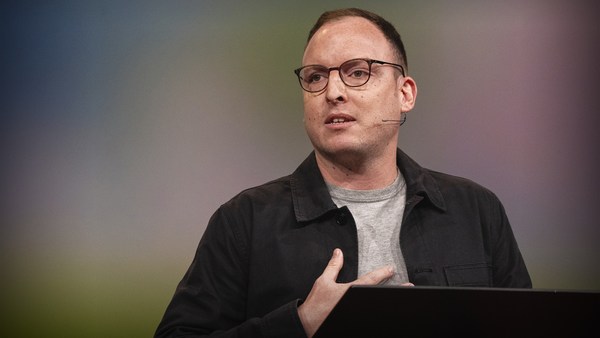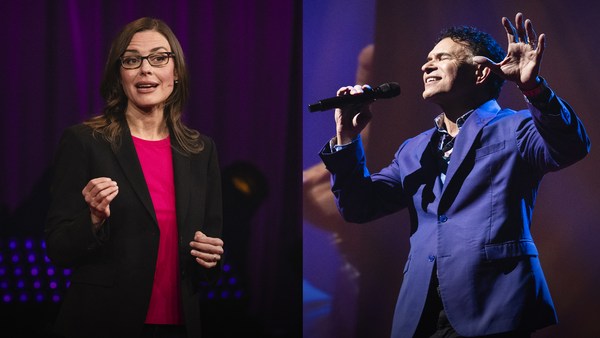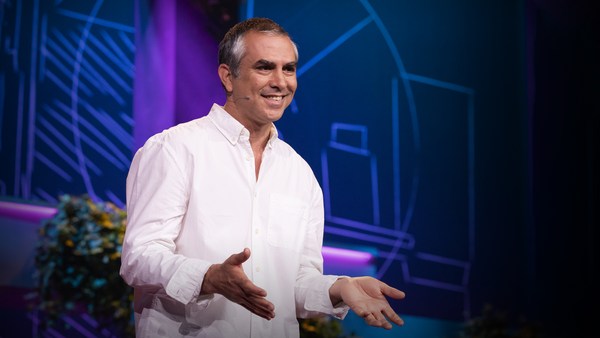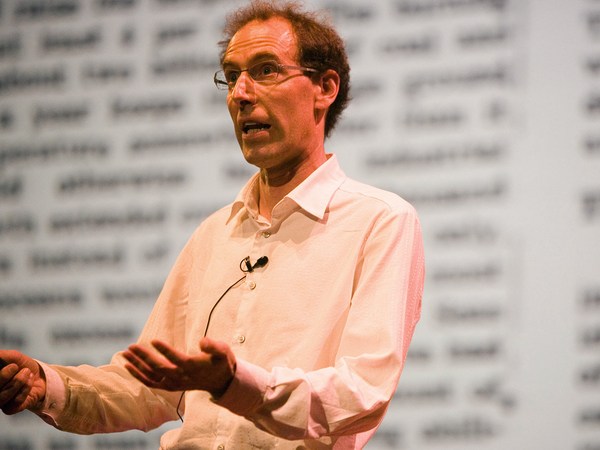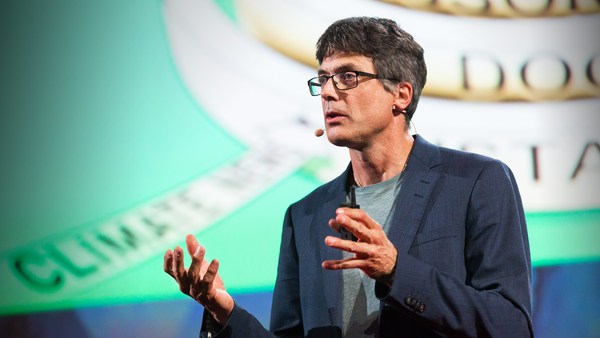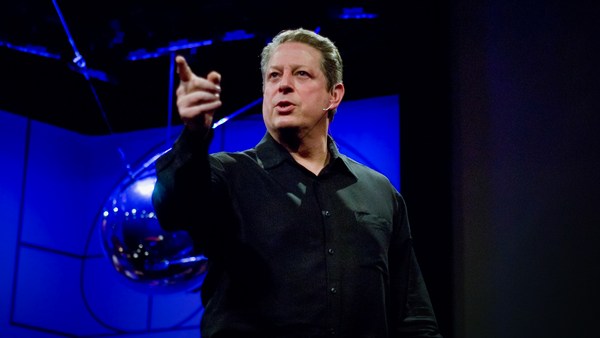Hi, I’m David. I'm a playwright from Ngunnawal country, the unceded lands of the Ngunnawal people in southeast Australia. I come from a family of climate scientists, and in 2014 I wrote a play entitled "Kill Climate Deniers."
(Laughter)
The play follows the story of a group of eco-terrorists who take over Australia's Parliament House during a Fleetwood Mac concert and hold the entire government hostage, demanding an instant end to climate change. So the story is ridiculous, but I wanted the play to start a conversation about what happens when the unstoppable force of climate change meets the immovable object of politics.
OK so obviously the title “Kill Climate Deniers” is provocative. But just to be clear, when I wrote it, I wasn't targeting anyone real. Now thanks to the work of journalists and scientists like Naomi Oreskes, we know how climate denial began. Oil and gas companies recognized the issue of greenhouse gas emissions back in the 1950s and '60s. They set out to cast doubt on the science. They funded lobby groups, marketing firms, politicians. They astroturfed an entire climate denial movement into being. So now there's this industry of pundits and journalists who make a living denying the reality of climate change.
When I made the statement "Kill Climate Deniers," I expected outrage from these people. But I did not expect pushback from the general public. I figured there are no real climate deniers. If there are regular, normal people who don't believe in climate science, they can't be that passionate. So I was very wrong.
(Laughter)
Now to begin with, the play received exactly the attention I expected from exactly the people I expected. When the first production was announced in 2014, a conservative politician in my hometown of Canberra called for the play to be shut down. There were angry articles in the Murdoch press Breitbart, Infowars, all the usual suspects in the right-wing media machine. Some of these pundits accused the play of being an "incitement to terrorism," and they referred me to the police. Their argument was that people would see the show and be inspired to take an entire government hostage to end climate change.
Now the theater company didn’t have money for lawyers or a crisis communications team, so out of concern for the actors' safety, the production was cancelled. But I didn't like backing down. It didn't feel good. I felt as if giving up on the project was like agreeing with the people attacking it. And I did not agree with them. The play was not an incitement to terrorism. But no theater company was willing to take the risk of being referred to the police. I couldn't get it up as a show.
So instead, my musician friend Reuben Engel turned it into an album. Reuben sampled dialogue from the play and wove it into a series of original electronic tracks. We toured that record around Australia. We couldn't get into theaters, so we went to nightclubs, we held dance parties. Then we launched an unauthorized covert walking tour of Parliament House. People downloaded a special version of the album on headphones and listened to the music and the story while walking around the real-life setting of Australia's halls of power. Like so.
(Applause)
(Music)
(Music ends) Now all of this helped to build up an audience for the project. But even more importantly, there were no real-life copycats. Not one government building was taken hostage by eco-terrorists during a Fleetwood Mac concert.
So four years after the original production was canceled, the play finally made it to the stage in 2018 at the Griffin Theatre in Sydney, followed by productions in Prague, London, Los Angeles and so on. Obviously I was very happy. And in one version of the story, that's where it ends. This project just joins a long list of things right-wing commentators have found to be outraged about, alongside Elvis, smartphones, twerking, Miley Cyrus, Fortnite, the Beat Generation, skateboarding, Woodstock, Woodstock '99, sugary cereal, TikTok, gay marriage, NWA, feminism, the Twist, Dungeons and Dragons, LiveJournal, shopping malls and women reading novels.
(Laughter)
But as the play made its way into the world, something else started happening. I started hearing from climate deniers. And not fossil-fuel pundits or right-wing journalists, real climate deniers. Regular, normal people. And I couldn't get my head around it. Like, why did they care so much? Like, if you're an ExxonMobil executive, then you have a financial incentive to downplay climate science. But if you're a high school teacher in Queensland or a massage therapist in Massachusetts, why would you spend your nights and weekends desperately trying to debunk Earth science research?
Now it turns out that although climate denial began as an astroturfed movement created by fossil fuel companies, it caught on because it connects with a certain group of people in a very real way. I got emails, I got physical letters, I got phone calls. They started showing up to performances of the play. And as the show got bigger and bigger, there were more and more of them, and they were passionate.
I wanted this play to start a conversation, and it did. It just was not the conversation I thought I was starting. I ended up speaking with hundreds of climate deniers over the course of this project. Now some of them wanted to insult me and threaten me. Some of them wanted to tell me variations on the same gag, like, "What if I wrote a play called 'Kill Climate Scientists?'" But some of them were interesting. These deniers wanted to explain to me why climate science was wrong. They had a whole worldview. They said, "The reality is, David, that climate change is a made up excuse for a huge program of top-down intervention. What climate activists really want is to stifle our freedoms. They want to control what we eat, they want to choke the life out of rural communities, and they want to throw the doors open to massive global migration."
Now I wanted to respond to these people and say, "I'm sorry, you're wrong. That's not what it's about." But the more I talked with them, the more I realized... They're right. They are completely correct. I mean, they're not correct about climate change being a made up excuse. That, sadly, is not true. But the consequences of climate change? Yes, diets are going to change. Yes, a lot of communities in exposed locations will be forced to leave. Yes, there will be huge movements of people within and between countries, they're right. And we don't even realize how right they are.
I believe in the science of climate change, and so do probably most of the people in this room. But more often than not, we go about our lives as if it's not real. We plan our careers, we build houses, we educate our children as if the future will look like the past. But the world we're educating them for no longer exists. At one degree warming, we are already on a planet unlike anywhere humans have ever lived in the past, and our systems are starting to buckle under the strain.
Now whether you believe that we are sleepwalking into disaster or if you think we're going to turn things around through high-tech solutions or massive social movements, whatever climate future you believe in, our lives are going to radically change. Our future will not look like our past. We accept the science, but we haven't processed the consequences. We don't explicitly deny climate change, but in our actions, we're like soft deniers, stealth deniers. I'm one of these people. Maybe you are too. I keep my carbon footprint as low as possible. But then I got on a plane to give this talk. I read research reports about which cities will be vulnerable in future decades to climate shocks, resource shocks. And then I forget all that and think, I just want to buy a flat in my hometown. If you believe something but you act like you don't believe it, do you really believe it?
Now climate deniers understand the consequences of the science, so they don't accept the science. They know what it means if it's true, so they won't allow it to be true. I think we can learn from climate deniers. I want to be more like that high school teacher in Queensland, that massage therapist in Massachusetts, because they live what they believe. You and I, we think we know better. We are the ones in denial. And I know deep down that the longer we deny reality, the harder the shock when it hits.
Thank you.
(Applause)
